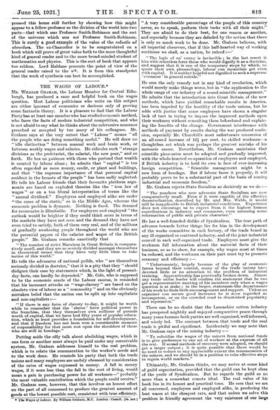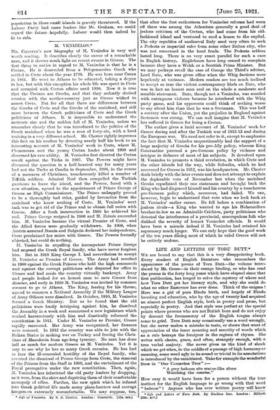THE WAGES OF LABOUR.* Ma. Wnixor GRAHAM., the Labour Member
for Central Edin- burgh, has produced a sane and helpful book on the wages question. Most Labour politicians who write on this subject are either ignorant of economics or desirous only of proving some fantastic theory. It is a pleasure to find that the Labour Party has at least one member who has studied economic method, who faces the facts of modem industrial competition, and who is not afraid to say what he thinks about the subversive nonsense preached or accepted by too many of his colleagues. Mr. Graham says at the very outset that " Labour " means " all the people who are doing something useful." He will draw no " idle distinction " between manual work and brain work, or between weekly wages and salaries. He ridicules such " strange divisions as the proletariat, the salariat, the new poor," and so forth. He has no patience with those who pretend that wealth is created by labour alone ; he admits that " capital " is too often regarded as mere money, credit, or plant and buildings, and that " the supreme importance of that personal capital resident in the breasts of the people" has been sadly neglected. He tells his Labour friends that their favourite platform argu- ments are based on exploded theories like the " iron law of wages " or on a too literal interpretation of terms like the " annual dividend." Employers and employed alike are under "the curse of the static," as in the Middle Ages, whereas the economic problem is dynamic. Nothing is fixed. The demand for necessaries is illimitable. For employers and employed " the outlook would be brighter if they could think more in terms of the markets they have not seen and the demand they have not even tried to satisfy, both of them very real, and of the millions of gradually awakening people throughout the world who are the potential payers of the salaries and wages of the British people." Mr. Graham remarks caustically that
" The number of strict Marxism in Great Britain is compara- tively small, and they are so acutely divided amongst themselves in theoretical issues that they have very little time to take notice of this world."
He tells the advocates of national guilds, who " are themselves
seriously divided in doctrine," that it is a pity that they " should disfigure their case by statements which, in the light of present-
day facts, can hardly be depended." Mr. Colo, who is supposed to be the economic oracle of the Labour caucus, is reminded that his incessant attacks on " wage-slavery " are based on the obsolete view of labour as a " commodity " and on the obviously mistaken belief that the nation can be split up into capitalists
and non-capitalists :-
" If there is any form of slavery to-day, it might be worth while to remember that the ' slaves ' have political power in the franchise, that they themselves own millions of pounds worth of capital, that we have had fifty years of popular educa- tion, which at least provides a foundation for self-development, and that if freedom has not been won a considerable measure of responsibility for that must rest upon the shoulders of those who are still in bondage."
Putting aside the silly talk about abolishing wages, which in one form or another must always be paid under any conceivable system, Mr. Graham addresses himself to the real problem, which is to relate the remuneration to the worker's needs and to the work done. He reminds his party that both the trade unions and many employers are unduly obsessed by consideration of the rates of wages expressed in money. A fall in money wages, if it were less than the fall in the cost of living, would mean a gain in purchasing power for all workmen—" probably the most valuable contribution which the people could receive." Mr. Graham sees, however, that this involves an honest effort on the part of all concerned to produce the greatest amount of goods at the lowest possible cost, consistent with true efficiency.
• The Wages of Labour. By William Graham, M.P. London : Cassell. tee. net.]
" A very considerable percentage of the people of this country never, so to speak, perform their tasks with all their might." They are afraid to do their best, for one reason or another, and especially because they are deluded by the notion that there is only so much work to be done. Mr. Graham believes, with all impartial observers, that if this half-hearted way of working continues we shall, as a nation, be ruined
" The logic of Ca' canny is invincible ; in the last resort it hits with relentless force those who would dignify it as a doctrine, and suggest that it is one of the temporary steps by which, to quote their own phraseology, labour can meantime get even with capital. It is neither hopeful nor dignified to seek a supreme ` evenness ' in general suicide."
He sees the only remedy not in any kind of revolution, which would merely make things worse, but in "the application to the whole range of our industry of a sound scientific management." He admits that the introduction into Great Britain of the new methods, which have yielded remarkable results in America, has been impeded by the hostility of the trade unions, but he adds with justice that some employers have shown a singular lack of tact in trying to impose the improved methods upon their workmen without consulting them beforehand and explain- ing the benefits of the change. Government interference with methods of payment by results during the war produced confu- sion, especially Mr. Churchill's most unfortunate concession of an all-round increase of 12i per cent. to skilled workmen—a thoughtless act which was perhaps the greatest mistake of his meteoric career. Nevertheless, Mr. Graham maintains that scientific piece-rates must be adopted and gradually improved, with the whole-hearted co-operation of employers and employed, if British industry is to hold its own in face of ever-ineresaing foreign competition. " Scientific management might be a new form of bondage. But if labour faces it properly, it will probably prove to be a substantial part of the basis of coming industrial and economic freedom."
Mr. Graham rejects State Socialism as decisively as we do :-
" The numbers who now advocate State Socialism are now comparatively small. Even if it were capable of the effective decentralization described by Mr. and Mrs. Webb, it would still be inapplicable to British industrial conditions. Experience does not encourage us to expect from it the highest human contributions in industry and commerce, even assuming some reformation of public and private character."
He has a well-founded dislike of Syndicalism. The true path of advance towards better things lies for him in the development of the works committee in each factory, of the trade board in any ill-organized or scattered industry, and of the joint industrial council in each well-organized trade. Employers must give the workmen full information about the material facts of their business, so as to show, for example, why wages must at times be reduced, and the workmen on their part must try to promote economy and efficiency :—
" Unfortunately, largely because of the play of economic forces beyond their control, many of the trade unions have devoted little or no attention to the problem of industrial training. Apprenticeship has practically broken down. Almost any trade union leader will confirm the statement that he can get a representative meeting of his members only when a wages question is at stake ; in the larger, statesman-like departments of his work he finds little encouragement and support. Unless an organizer can secure good increases lie is soon regarded as incompetent, or on the crowded road to diminished popularity and reputation."
There can be no doubt that the Lancashire cotton industry has prospered mightily and enjoyed comparative peace through many years because both parties are well organized, well informed, and wisely led. The contrast between that trade and the coal trade is pitiful and significant. Incidentally we may note that Mr. Graham says of the mining industry :— " To subsidize the wages of the minors from national funds is to give preference to ono sot of workers at the expense of all the rest. If sound methods of recovery were adopted, we should get a larger output ; it is quite possible that there would be no need to reduce to any appreciable extent the remuneration of the miners, and we should be in a position to take effective steps to regain world markets."
Ultimately, Mr. Graham thinks, we may arrive at some kind of guild organization, provided that the guild can be kept clear of the perils of Syndicalism. But he regards the guild as no more than a somewhat remote ideal. The real value of his book lies in its honest and practical tone. He sees that we are all concerned, employers and employed alike, in producing the best wares at the cheapest rate, and that unless we solve this problem in friendly agreement the very existence of- our large population in these email islands is gravely threatened. If the Labour Party had more leaders like Mr. Graham, we could regard the :future hopefully. Labour would then indeed be fit to mile.



































 Previous page
Previous page